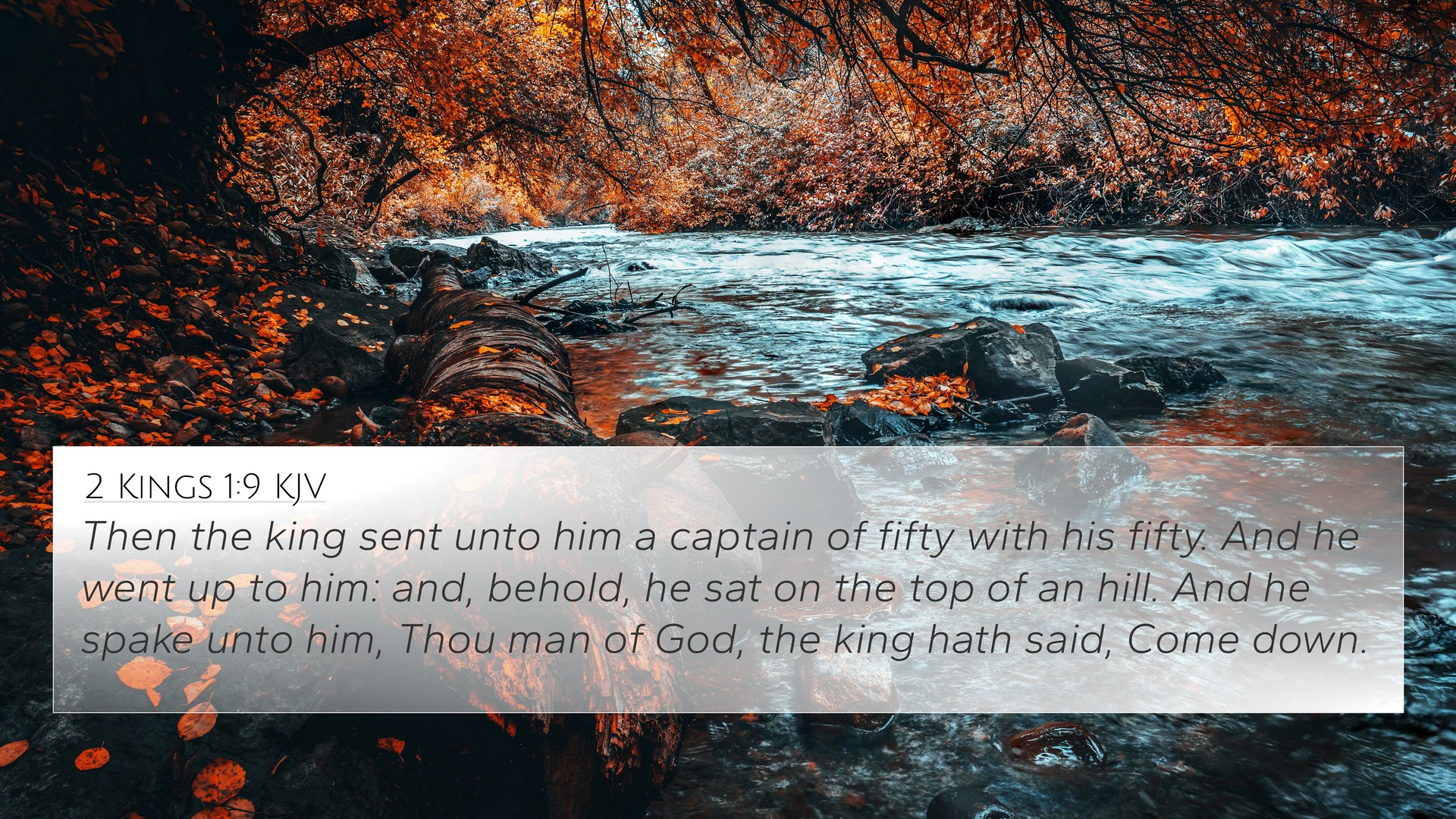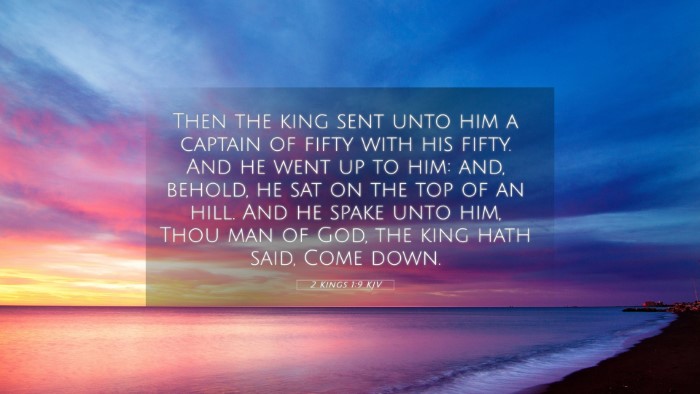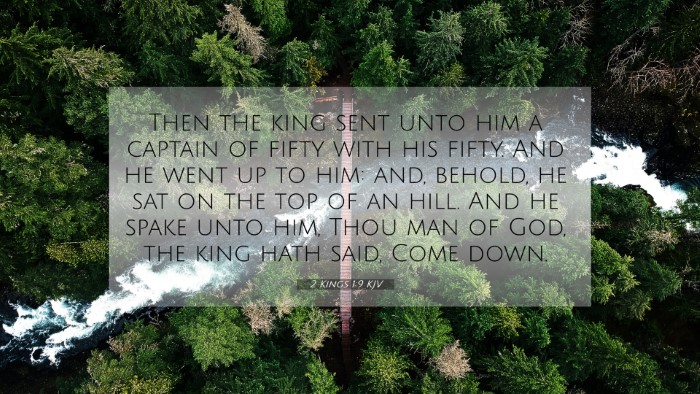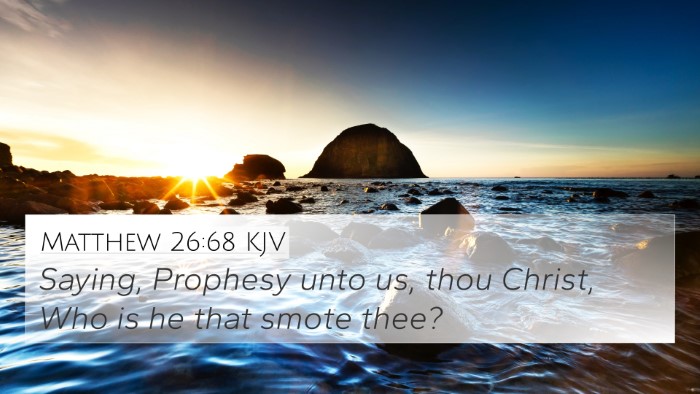Old Testament
Genesis Exodus Leviticus Numbers Deuteronomy Joshua Judges Ruth 1 Samuel 2 Samuel 1 Kings 2 Kings 1 Chronicles 2 Chronicles Ezra Nehemiah Esther Job Psalms Proverbs Ecclesiastes Song of Solomon Isaiah Jeremiah Lamentations Ezekiel Daniel Hosea Joel Amos Obadiah Jonah Micah Nahum Habakkuk Zephaniah Haggai Zechariah Malachi2 Kings 1:9 Similar Verses
2 Kings 1:9 Cross References
Then the king sent unto him a captain of fifty with his fifty. And he went up to him: and, behold, he sat on the top of an hill. And he spake unto him, Thou man of God, the king hath said, Come down.
Uncover the Rich Themes and Topics of This Bible Verse
Listed below are the Bible themes associated with 2 Kings 1:9. We invite you to explore each theme to gain deeper insights into the Scriptures.
2 Kings 1:9 Cross Reference Verses
This section features a detailed cross-reference designed to enrich your understanding of the Scriptures. Below, you will find carefully selected verses that echo the themes and teachings related to 2 Kings 1:9 KJV. Click on any image to explore detailed analyses of related Bible verses and uncover deeper theological insights.
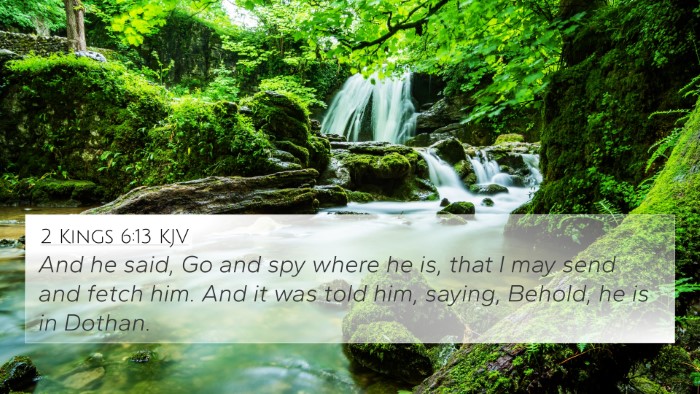
2 Kings 6:13 (KJV) »
And he said, Go and spy where he is, that I may send and fetch him. And it was told him, saying, Behold, he is in Dothan.
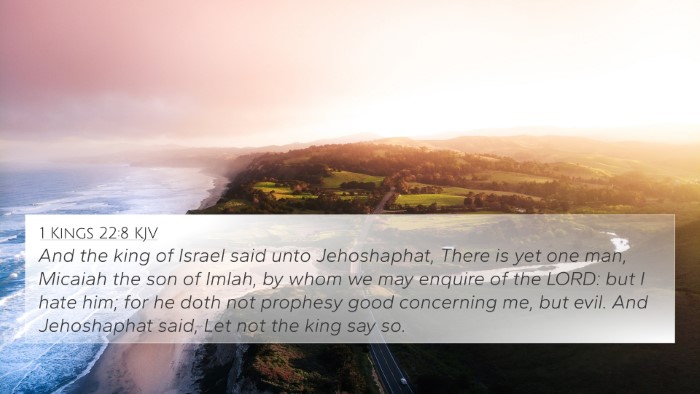
1 Kings 22:8 (KJV) »
And the king of Israel said unto Jehoshaphat, There is yet one man, Micaiah the son of Imlah, by whom we may enquire of the LORD: but I hate him; for he doth not prophesy good concerning me, but evil. And Jehoshaphat said, Let not the king say so.
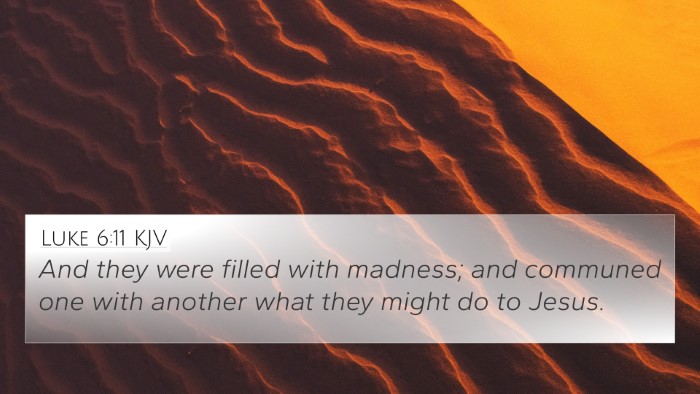
Luke 6:11 (KJV) »
And they were filled with madness; and communed one with another what they might do to Jesus.
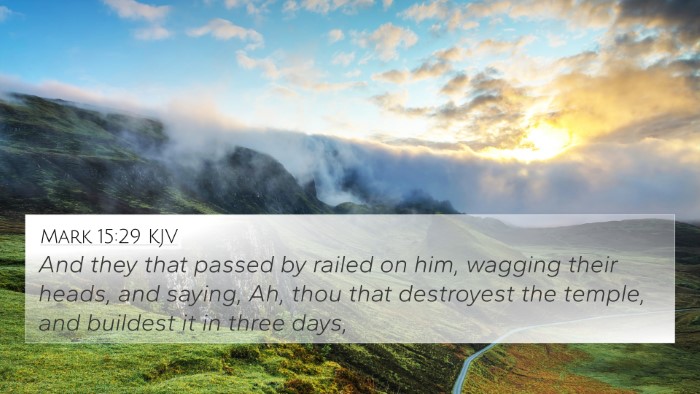
Mark 15:29 (KJV) »
And they that passed by railed on him, wagging their heads, and saying, Ah, thou that destroyest the temple, and buildest it in three days,
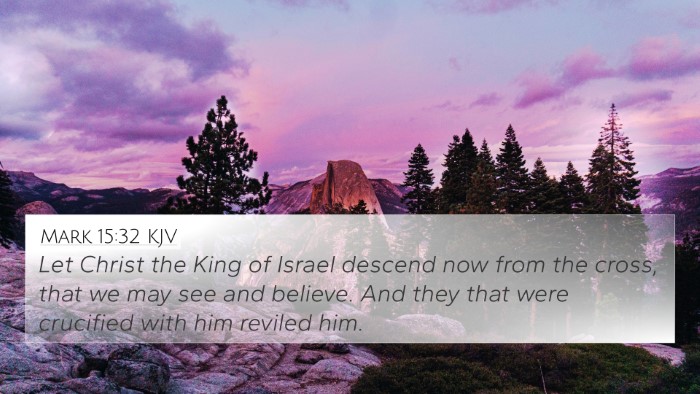
Mark 15:32 (KJV) »
Let Christ the King of Israel descend now from the cross, that we may see and believe. And they that were crucified with him reviled him.
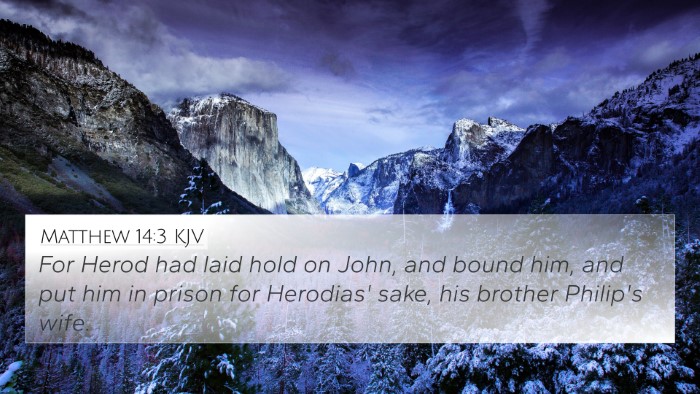
Matthew 14:3 (KJV) »
For Herod had laid hold on John, and bound him, and put him in prison for Herodias' sake, his brother Philip's wife.
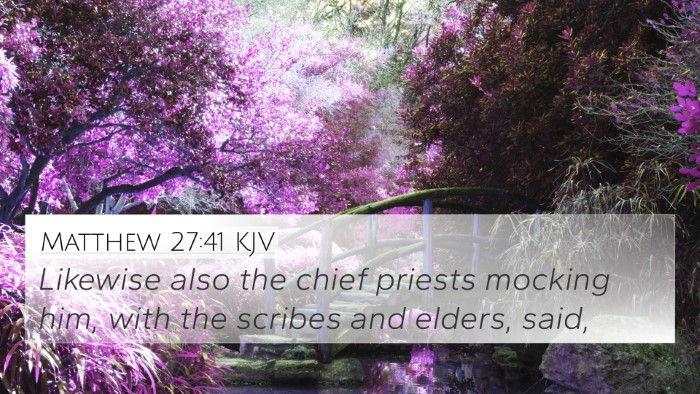
Matthew 27:41 (KJV) »
Likewise also the chief priests mocking him, with the scribes and elders, said,
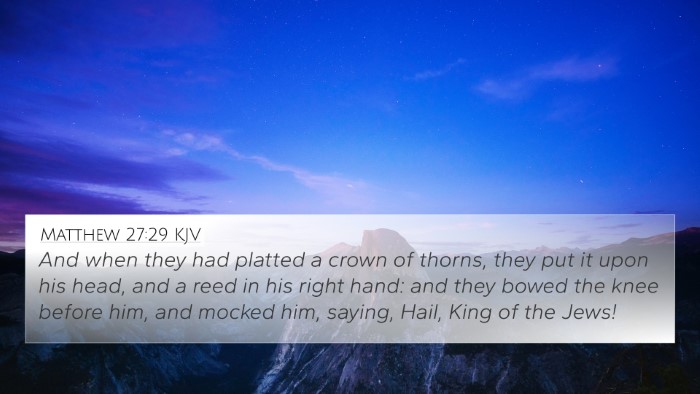
Matthew 27:29 (KJV) »
And when they had platted a crown of thorns, they put it upon his head, and a reed in his right hand: and they bowed the knee before him, and mocked him, saying, Hail, King of the Jews!
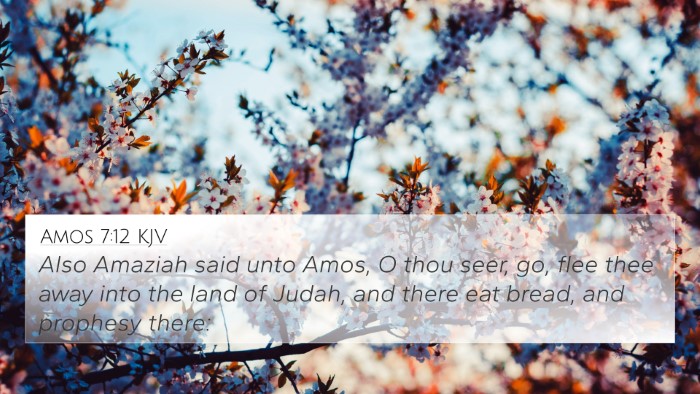
Amos 7:12 (KJV) »
Also Amaziah said unto Amos, O thou seer, go, flee thee away into the land of Judah, and there eat bread, and prophesy there:
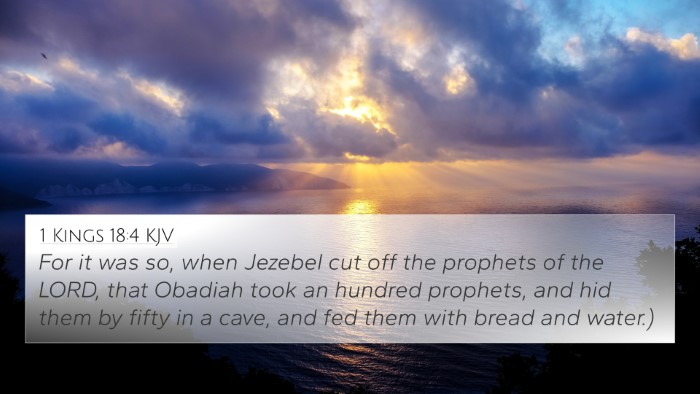
1 Kings 18:4 (KJV) »
For it was so, when Jezebel cut off the prophets of the LORD, that Obadiah took an hundred prophets, and hid them by fifty in a cave, and fed them with bread and water.)
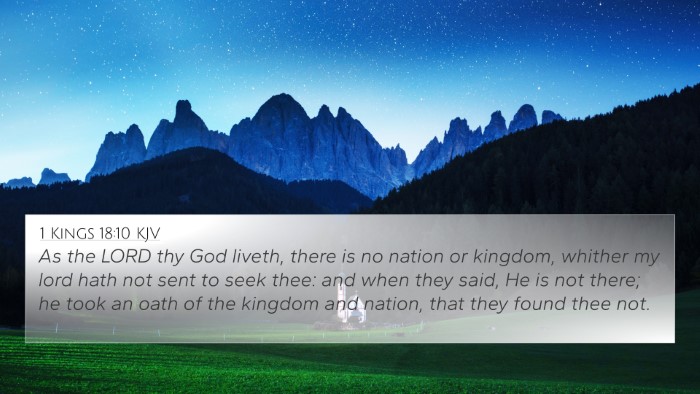
1 Kings 18:10 (KJV) »
As the LORD thy God liveth, there is no nation or kingdom, whither my lord hath not sent to seek thee: and when they said, He is not there; he took an oath of the kingdom and nation, that they found thee not.
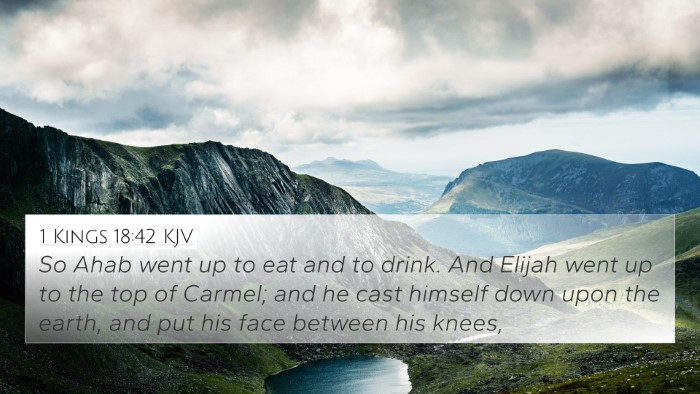
1 Kings 18:42 (KJV) »
So Ahab went up to eat and to drink. And Elijah went up to the top of Carmel; and he cast himself down upon the earth, and put his face between his knees,
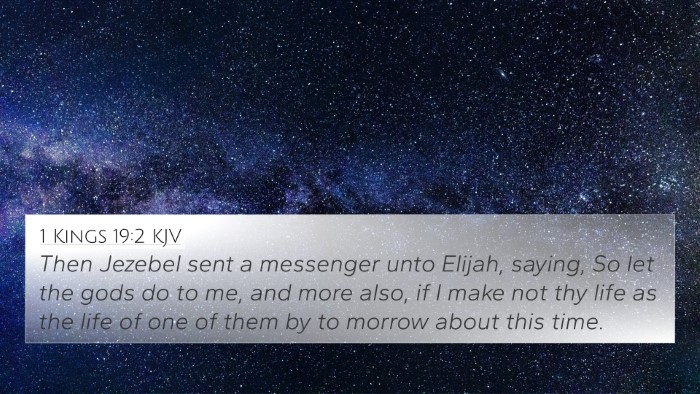
1 Kings 19:2 (KJV) »
Then Jezebel sent a messenger unto Elijah, saying, So let the gods do to me, and more also, if I make not thy life as the life of one of them by to morrow about this time.
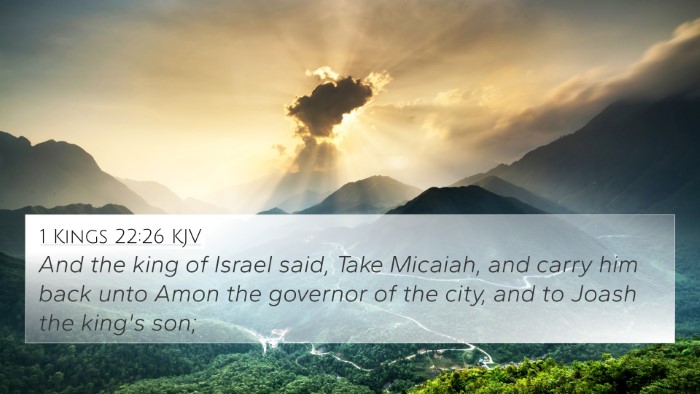
1 Kings 22:26 (KJV) »
And the king of Israel said, Take Micaiah, and carry him back unto Amon the governor of the city, and to Joash the king's son;
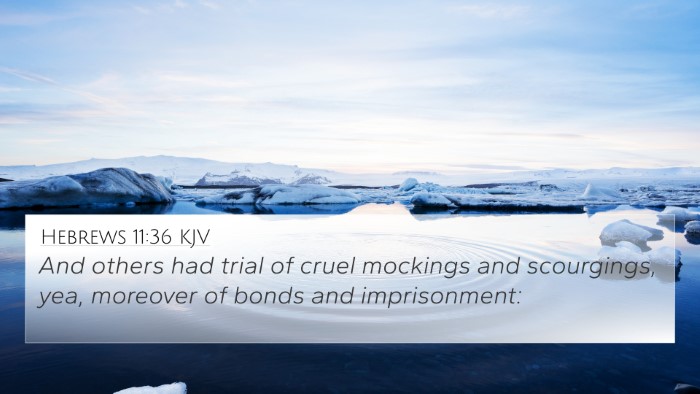
Hebrews 11:36 (KJV) »
And others had trial of cruel mockings and scourgings, yea, moreover of bonds and imprisonment:
2 Kings 1:9 Verse Analysis and Similar Verses
Understanding 2 Kings 1:9
2 Kings 1:9 states: "Then the king sent to him a captain of fifty with his fifty men. So he went up to him, and there he was, sitting on the top of a hill. And he spoke to him: 'Man of God, the king has said, "Come down!"'
Summary of Insights
This verse contains pivotal moments that highlight conflict and authority in the narrative of the prophet Elijah. By analyzing this verse, we can derive themes related to divine authority, obedience, and the tension between earthly powers and spiritual mandates.
Commentary Insights
-
Matthew Henry's Commentary:
Henry suggests that this encounter illustrates God's continuing relationship with His prophets and His power over kings. The captain's confrontation with Elijah indicates not only the king's authority but how it is met with divine opposition.
-
Albert Barnes' Notes:
Barnes emphasizes the audacity of the king sending a captain to summon Elijah. The boldness of the request demonstrates a lack of respect for God's messenger, illustrating the prevailing attitude of the ruling powers against God's will.
-
Adam Clarke's Commentary:
Clarke adds depth by noting the geographical and symbolic significance of the hill, representing a place of revelation and divine descent. Elijah's position signifies his authority as a prophet, which contrasts with the king’s desires.
Thematic Connections
The themes present in 2 Kings 1:9 resonate throughout Scripture, specifically highlighting the dynamics of power and the sovereignty of God. The relationships depicted here can be understood through several thematic connections:
1. Divine Authority vs. Earthly Power
This theme plays out throughout the Old Testament, as seen in contrasting figures of kings and prophets. It mirrors other biblical instances where God's chosen representatives face off against human authority striving to undermine divine purposes.
2. The Prophet as God’s Messenger
The role of a prophet is underscored here, fulfilling essential functions of communication between God and humanity. Elijah stands as an example for those seeking to understand prophetic ministry.
3. Obedience to God’s Will
The demand for Elijah to come down speaks to broader themes of obedience and respect for divine instructions. This can be cross-referenced with New Testament scriptures discussing submission to God's direction over human authority.
Cross-Referencing Biblical Texts
To fully comprehend the message behind 2 Kings 1:9, consider the following biblical cross-references:
- 1 Kings 18:21 - Elijah's challenge to the prophets of Baal illustrates the ongoing struggle between God and idolatry.
- Daniel 3:16-18 - The refusal of Shadrach, Meshach, and Abednego underscores steadfastness against kingly demands.
- Acts 4:19-20 - The apostles' insistence on proclaiming God's message exemplifies the obligation of divine obedience over human commands.
- James 5:17 - This verse references Elijah as a powerful prophet whose prayers brought significant change, asserting God's authority through him.
- Exodus 7:1 - Moses is called both a prophet and a god to Pharaoh, indicating the authority-based interactions between divine servants and monarchs.
- Matthew 10:20 - Jesus assures His disciples that they will be guided by the Holy Spirit, similar to Elijah's role in speaking God's words.
- Romans 13:1 - While discussing the relationship between authorities, it still emphasizes that all authority is instituted by God, correlating with Elijah's role as a prophet supporting divine sovereignty.
Conclusion
2 Kings 1:9 invites readers to reflect on the tensions between divine authority and earthly power, illustrating that those who serve God are often placed in situations that challenge both their faith and the perception of human authority. By studying this verse alongside its biblical connections, one gains a deeper understanding of God's role and the obedience required from His messengers.
Reflective Questions
Considering the complexities of this verse and its commentary insights, here are some reflective questions:
- How can we apply Elijah's example of faithfulness in our lives today?
- In what ways do we see conflicts between authority and God's will in contemporary society?
- What can we learn from the responses of God’s messengers when faced with challenges to their authority?
Further Study Tools
For those interested in exploring the connections between Bible verses more deeply, the following tools can be beneficial:
- Bible concordance as a resource for finding thematic connections.
- Bible cross-reference guide for systematic study.
- Cross-reference Bible study methodologies for individual or group Bible study sessions.
- Comprehensive Bible cross-reference materials that outline significant relationships across the text.
Engaging with Scripture
Delving into cross-references enhances understanding of biblical themes and the relationships between Old and New Testament scriptures. By correlating passages such as 2 Kings 1:9 with Psalms or New Testament teachings, one can explore rich theological concepts and varying interpretations, fostering a holistic view of scripture.
